Related Research Articles

Alberto Ruiz-Gallardón Jiménez is a Spanish politician and former Minister of Justice. He was mayor of Madrid between 2003 and 2011. A stalwart of the conservative People's Party (PP), he has previously been a leading figure in various local and national legislative bodies. In December 2011 Ruiz-Gallardón was appointed Minister of Justice in Mariano Rajoy's inaugural cabinet. He resigned in September 2014.

María Teresa Fernández de la Vega Sanz is a Spanish politician and magistrate of the Socialist Party. During her political career, she served as first deputy prime minister, minister of the Presidency and government spokesperson under prime minister José Luis Rodríguez Zapatero from 2004 to 2010 and as president of the Council of State from 2018 to 2022, being the first first female deputy prime minister and the first female president of the advisory council.

The Supreme Court is the highest court in the Kingdom of Spain. The court has original jurisdiction over cases against high-ranking officials of the Kingdom and over cases regarding the legalization of political parties. It also has ultimate appellate jurisdiction over all cases. The Court has the power of judicial review, except for the judicial revision on constitutional matters, reserved to the Constitutional Court.

The Court of Justice of the European Union (CJEU) is the judicial branch of the European Union (EU). Seated in the Kirchberg quarter of Luxembourg City, Luxembourg, this EU institution consists of two separate courts: the Court of Justice and the General Court. From 2005 to 2016, it also contained the Civil Service Tribunal. It has a sui generis court system, meaning 'of its own kind', and is a supranational institution.
Verica Trstenjak is a Slovenian Doctor of Laws and Professor of European Law based in Vienna, Austria. From 2006 to 2012 she has been an Advocate General at the Court of Justice of the European Union in Luxembourg (CJEU), from 2004 to 2006 judge of the General Court.
Antonia Jiménez Trava was a Mexican attorney. She was the first female law graduate from UADY, and the first woman appointed to public office in Yucatán. She served as the first Director of the Civil Registry, the first President of the Electoral Institute of the State, and the first President of the Judiciary. She was a feminist, writing her dissertation on the legality of denying women the vote and when appointed to run the Civil Registry, she eliminated discriminatory texts from the marriage ceremony.

Manuela Carmena Castrillo is a retired Spanish lawyer and judge who served as Mayor of Madrid from June 2015 to June 2019. She was a member of the General Council of the Judiciary.
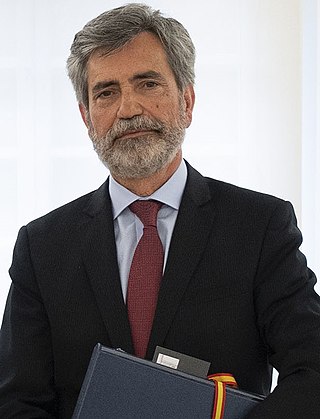
Carlos Lesmes Serrano is a Spanish magistrate and prosecutor who served as president of the Supreme Court and president of the General Council of the Judiciary (CGPJ) from 2013 to 2022. Since December 2018, he served in acting capacity in both posts, as his mandate expired at the time and the renovation of the CGPJ was blocked from then on. He is seen as a Conservative jurist with a religious background.

Consuelo Madrigal Martínez-Pereda is a Spanish prosecutor who currently serves as prosecutor in the Spanish Supreme Court. Previously, she served as Attorney General of Spain between January 2015 and November 2016, being the first woman to hold this position.

María Margarita Robles Fernández is a Spanish judge and politician, currently serving as Minister of Defence since June 2018. From November 2019 to January 2020, she served as Acting Minister of Foreign Affairs.

Dolores Delgado García is a Spanish prosecutor who served as Attorney General of Spain from 2020 to 2022. Previously, she served as Minister of Justice and First Notary of the Kingdom from 2018 to 2020, in the first Pedro Sánchez administration.
Lapuerta is a surname. Notable people with the surname include:

The Prosecution Ministry or Public Prosecutor's Office is a constitutional body which has full autonomy within the judiciary of Spain. It is entrusted with defending the rule of law, the rights of the citizens, and public interest, as well as watching over the independence of the courts of justice.

The Palais de la Cour de Justice is a building complex acting as the seat of the Court of Justice of the European Union (CJEU), located in the European district of the Luxembourg City quarter of Kirchberg. Today the Palais complex encompasses the original 1973 building, now known as the Ancien Palais, which houses the court rooms of the CJEU's Court of Justice, the Anneau building, encircling the Ancien Palais, which contains the judges chambers and deliberative rooms, the three tower buildings containing the CJEU's translation services, and the Gallery building, containing the CJEU's legal library and linking all the structures of the Palais complex with the renovated three annexes originally constructed between 1978 and 1994 that now host the court rooms of the CJEU's General Court.

The Velasco III Cabinet constituted the 10th and 11th cabinets of the Bolivian Republic. It was formed on 27 March 1839, thirty-three days after José Miguel de Velasco was reinstalled as the 4th president of Bolivia following a coup d'état, succeeding the Santa Cruz Cabinet. It was dissolved on 10 June 1841 upon Velasco's overthrow in another coup d'état and was succeeded by the Cabinet of José Ballivián.
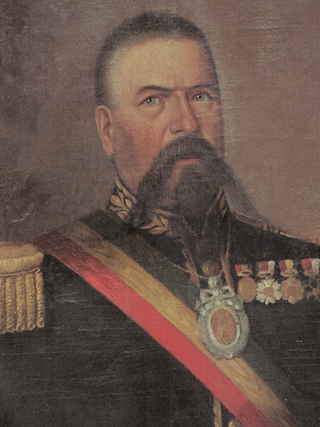
The Morales Cabinet constituted the 31st to 32nd cabinets of the Republic of Bolivia. It was formed on 22 June 1871 after Agustín Morales took power in a coup d'état, succeeding the Melgarejo cabinet. It was dissolved on 27 November 1872 when Morales was assassinated. All Ministers of State were ratified in their positions by the new cabinet formed by Morales' successor Tomás Frías.

The Daza cabinet constituted the 36th to 37th cabinets of the Republic of Bolivia. It was formed on 28 October 1876, four months after Hilarión Daza was installed) as the 19th president of Bolivia following a coup d'état, succeeding the Frías cabinet. It was dissolved on 28 December 1879 upon Daza's overthrow in another coup d'état and was succeeded by the Cabinet of Narciso Campero.
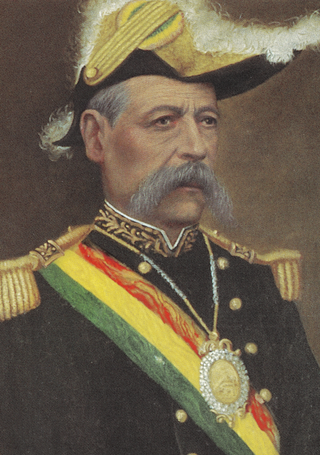
The Campero Cabinet constituted the 39th to 41st cabinets of the Republic of Bolivia. It was formed on 20 June 1880, five months after Narciso Campero was installed as the 20th president of Bolivia following the War of the Pacific, succeeding the Daza Cabinet. It was dissolved on 4 September 1884 upon the end of Campero’s term and was succeeded by the Cabinet of Gregorio Pacheco.
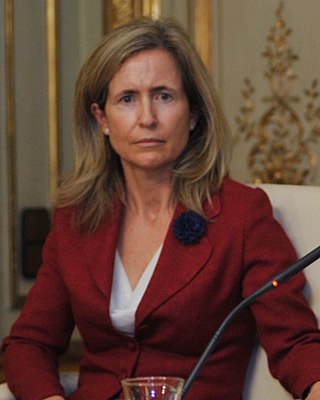
Marta Silva de Lapuerta is a Spanish jurist. A member of the State Lawyers Corps since 1996, she was the Solicitor General of Spain from 2012 to 2016, the first woman to hold the office. She also served on the boards of Real Madrid CF and Sacyr.
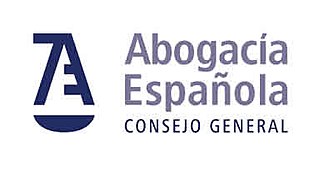
The General Council of Spanish Lawyers is the supreme representative and executive body of all the bar associations and lawyers of Spain.
References
- ↑ "Presentation of the Members". European Court of Justice. Retrieved 2012-06-29.
- ↑ "PRESS RELEASE No 85/03". European Court of Justice. 7 October 2003. Retrieved 2009-04-29.
- ↑ "PDF CV" (PDF). Retrieved 2012-06-29.
- ↑ Sánchez, Álvaro (2018-10-20). "La española que paraliza la purga del Supremo polaco". El País (in Spanish). ISSN 1134-6582 . Retrieved 2019-12-23.
- ↑ Jeanette Minns (October 2, 2014), Judges staying on Politico Europe .
- ↑ America Hernandez and Aitor Hernández-Morales (May 21, 2021), EU court orders a Polish coal mine to pause operations Politico Europe .
- ↑ "CURIA - Rosario Silva de Lapuerta". curia.europa.eu. Retrieved 2022-04-22.